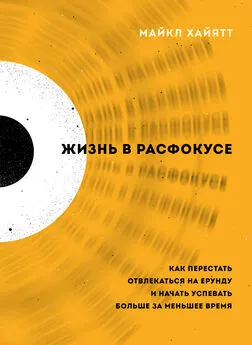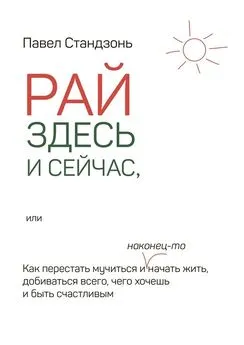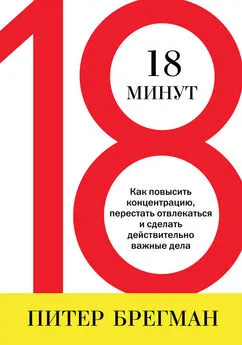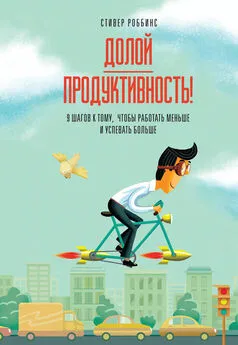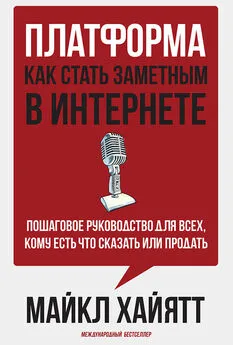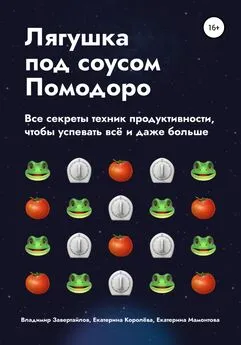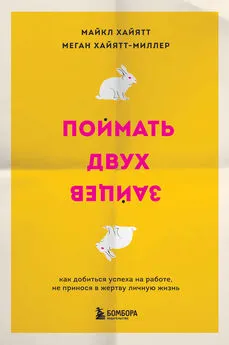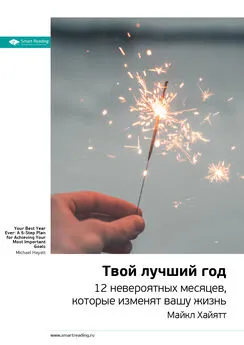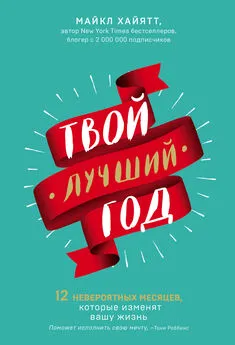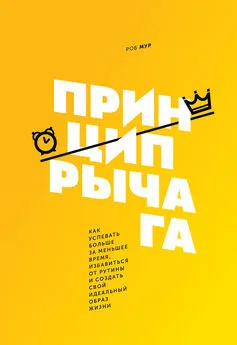Майкл Хайятт - Жизнь в расфокусе. Как перестать отвлекаться на ерунду и начать успевать больше за меньшее время
- Название:Жизнь в расфокусе. Как перестать отвлекаться на ерунду и начать успевать больше за меньшее время
- Автор:
- Жанр:
- Издательство:Литагент 5 редакция «БОМБОРА»
- Год:2021
- Город:Москва
- ISBN:978-5-04-156257-1
- Рейтинг:
- Избранное:Добавить в избранное
-
Отзывы:
-
Ваша оценка:
Майкл Хайятт - Жизнь в расфокусе. Как перестать отвлекаться на ерунду и начать успевать больше за меньшее время краткое содержание
• уделять максимум времени вдохновляющим задачам;
• установить баланс между работой и жизнью;
• перестать чувствовать себя виноватым во время отдыха;
• планировать свое время и энергию так же, как финансы.
Жизнь в расфокусе. Как перестать отвлекаться на ерунду и начать успевать больше за меньшее время - читать онлайн бесплатно ознакомительный отрывок
Интервал:
Закладка:
46
Bambi Francisco Roizen, “Elon Musk: Work Twice as Hard as Others,” Vator.TV, December 23, 2010, http://vator.tv/news/2010–12–23-elon-musk-work-twice-as-hard-as-others.
47
Michael D. Eisner, Work in Progress (New York: Hyperion, 1999), 301.
48
Jeffrey M. Jones, “In U.S., 40 % Get Less Than Recommended Amount of Sleep,” Gallup, December 19, 2013, http://news.gallup.com/poll/166553/less-recommended-amount-sleep.aspx.
49
Diane S. Lauderdale et al., “Objectively Measured Sleep Characteristics among Early-Middle-Aged Adults,” American Journal of Epidemiology 164, no.1 (July 1, 2006), https://academic.oup.com/aje/article/164/1/5/81104.
50
Tanya Basu, “CEOs Like PepsiCo’s Indra Nooyi Brag They Get 4 Hours of Sleep. That’s Toxic,” The Daily Beast, August 11, 2018, https://www.thedailybeast.com/ceos-like-pepsicos-indra-nooyi-brag-they-get-4-hours-of-sleep-thats-toxic. Katie Pisa, “Why Missing a Night of Sleep Can Damage Your IQ,” CNN, April 20, 2015, https://www.cnn.com/2015/04/01/business/sleep-and-leadership. Geoff Colvin, “Do Successful CEOs Sleep Less Than Everyone Else?” Fortune, November 18, 2015, http://fortune.com/2015/11/18/sleep-habits-donald-trump. According to one study, 42 percent of leaders get six hours of sleep or less each night. Christopher M. Barnes, “Sleep Well, Lead Better,” Harvard Business Review, September – October 2018.
51
Nick van Dam and Els van der Helm, “The Organizational Cost of Insufficient Sleep,” McKinsey Quarterly, February 2016, https://www.mckinsey.com/business-functions/organization/our-insights/the-organizational-cost-of-insufficient-sleep.
52
N. J. Taffinder et al., “Effect of Sleep Deprivation on Surgeons’ Dexterity on Laparoscopy Simulator,” The Lancet, October 10, 1998, http://www.thelancet.com/pdfs/journals/lancet/PIIS0140673698000348.pdf.
53
Maggie Jones, “How Little Sleep Can You Get Away With?” New York Times Magazine, April 15, 2011, http://www.nytimes.com/2011/04/17/magazine/mag-17Sleep-t.html.
54
Об этих и связанных с ними моментах см. Shawn Stevenson, Sleep Smarter (New York: Rodale, 2016); David K. Randall, Dreamland (New York: Norton, 2012); and Penelope A. Lewis, The Secret World of Sleep (New York: Palgrave Macmillan, 2014).
55
Lewis, The Secret World of Sleep, 18.
56
Jeff Bezos, “Why Getting 8 Hours of Sleep Is Good for Amazon Shareholders,” Thrive Global, November 30, 2016, https://www.thriveglobal.com/stories/7624-jeff-bezos-why-getting-8-hours-of-sleep-is-good-for-amazon-shareholders.
57
Matthew J. Belvedere, “Why Aetna’s CEO Pays Workers Up to $500 to Sleep,” CNBC, April 5, 2016, https://www.cnbc.com/2016/04/05/why-aetnas-ceo-pays-workers-up-to-500-to-sleep.html.
58
Alex Hern, “Netflix’s Biggest Competitor? Sleep,” Guardian, April 18, 2017, https://www.theguardian.com/technology/2017/apr/18/netflix-competitor-sleep-uber-facebook.
59
Alex Soojung-Kim Pang, Rest (New York: Basic, 2016), 110–128.
60
Barbara Holland, Endangered Pleasures (Boston: Little, Brown, 1995), 38.
61
Для оптимизации вашего ночного сна я рекомендую книгу Шона Стивенсона «Sleep Smarter», а для обеденного отдыха книгу Сары Медник «Take a Nap! Change Your Life» (New York: Workman, 2006).
62
“Just One-in-Five Employees Take Actual Lunch Break,” Right Management ThoughtWire, October 16, 2012, https://www.right.com/wps/wcm/connect/right-us-en/home/thoughtwire/categories/media-center/Just+OneinFive+Employees+Take+Actual+Lunch+Break.
63
“We’re Not Taking Enough Lunch Breaks. Why That’s Bad for Business,” NPR, March 5, 2015, https://www.npr.org/sections/thesalt/2015/03/05/390726886/were-not-taking-enough-lunch-breaks-why-thats-bad-for-business.
64
“Physical Activity and Health,” Centers for Disease Control and Prevention, February 13, 2018, https://www.cdc.gov/physicalactivity/basics/pa-health/index.htm.
65
“Physical Activity and Health,” CDC.
66
Ben Opipari, “Need a Brain Boost? Exercise,” Washington Post, May 27, 2014, https://www.washingtonpost.com/lifestyle/wellness/need-a-brain-boost-exercise/2014/05/27/551773f4-db92–11e3–8009–71de85b9c527_story.html.
67
Russell Clayton, “How Regular Exercise Helps You Balance Work and Family,” Harvard Business Review, January 3, 2014, https://hbr.org/2014/01/how-regular-exercise-helps-you-balance-work-and-family.
68
Clayton, “Regular Exercise”.
69
Tom Jacobs, “Want to Get Rich? Get Fit,” Pacific Standard, January 31, 2014, https://psmag.com/social-justice/want-get-rich-get-fit-72515.
70
Henry Cloud, The Power of the Other (New York: Harper Business, 2016), 9, 81.
71
Emily Stone, “Sitting Near a High-Performer Can Make You Better at Your Job,” KelloggInsight, May 8, 2017, https://insight.kellogg.northwestern.edu/article/sitting-near-a-high-performer-can-make-you-better-at-your-job.
72
Cloud, Power of the Other, 81.
73
Stone, “Sitting Near a High-Performer Can Make You Better at Your Job”.
74
Virginia Postrel, The Future and Its Enemies (New York: Free Press, 1998), 188.
75
Stuart Brown, Play (New York: Avery, 2010), 127.
76
Jeremy Lott, “Hobbies of Highly Effective People,” MichaelHyatt.com, November 7, 2017, https://michaelhyatt.com/hobbies-and-effectiveness/.
77
Paul Johnson, Churchill (New York: Penguin, 2009), 128, 163.
78
Winston S. Churchill, Painting as a Pastime (London: Unicorn, n. d.). He wrote this essay in 1948.
79
Shirley S. Wang, “Coffee Break? Walk in the Park? Why Unwinding Is Hard,” Wall Street Journal, August 30, 2011, https://www.wsj.com/articles/SB10001424053111904199404576538260326965724.
80
Chris Mooney, “Just Looking at Nature Can Help Your Brain Work Better, Study Finds,” Washington Post, May 26, 2015, https://www.washingtonpost.com/news/energy-environment/wp/2015/05/26/viewing-nature-can-help-your-brain-work-better-study-finds/.
81
Ruth Ann Atchley et al., “Creativity in the Wild: Improving Creative Reasoning through Immersion in Natural Settings,” PLOS One 7, no. 12 (December 12, 2012), http://journals.plos.org/plosone/article?id=10.1371/journal.pone.0051474.
82
Netta Weinstein, Andrew K. Przybylski, and Richard M. Ryan, “Can Nature Make Us More Caring?” Personality and Social Psychology Bulletin, August 5, 2009, https://journals.sagepub.com/doi/abs/10.1177/0146167209341649. Diane Mapes, “Looking at Nature Makes You Nicer,” NBCNews.com, October 14, 2009, http://www.nbcnews.com/id/33243959/ns/health-behavior/t/looking-nature-makes-you-nicer.
83
Jill Suttie, “How Nature Can Make You Kinder, Happier, and More Creative,” Greater Good, March 2, 2016, https://greatergood.berkeley.edu/article/item/how_nature_makes_you_kinder_happier_more_creative. Cecily Maller et al., “Healthy Nature Healthy People: ‘Contact with Nature’ as an Upstream Health Promotion Intervention for Populations,” Health Promotion International 21, no. 1 (March 2006), https://academic.oup.com/heapro/article/21/1/45/646436. “How Does Nature Impact Our Wellbeing?” Taking Charge of Your Health & Wellbeing (University of Minnesota), https://www.takingcharge.csh.umn.edu/enhance-your-wellbeing/environment/nature-and-us/how-does-nature-impact-our-wellbeing.
84
“Unplugged for 24 hours,” New Philosopher, February – April 2016.
85
Steve Turner, Beatles ’66 (New York: Ecco, 2016), 47.
86
Как выразились Фридерика Фабрициус и Ганс В. Хагеманн: «Никто не ставит под сомнение тот факт, что с вами нельзя связаться, когда вы уже находитесь на важной встрече, но часто существует негласное предположение, что когда вы не на встрече, то являетесь свободным. И все же, когда вам нужно сосредоточиться, вы находитесь на важной встрече – с самим собой». The Leading Brain (New York: TarcherPerigree, 2017), 91–92.
87
William Ury, The Power of a Positive No (New York: Bantam, 2007), 10–15.
88
Ury, Positive No, 14.
89
Ury, Positive No, 16–18.
90
“Ritual,” Dictionary.com, http://www.dictionary.com/browse/ritual.
91
Mason Currey, Daily Rituals (New York: Knopf, 2015), xiv. Also see Pang’s discussion of morning routines in Rest, 75–92.
92
Atul Gawande, “The Checklist,” New Yorker, December 10, 2007, https://www.newyorker.com/magazine/2007/12/10/the-checklist. See also Gawande’s book, The Checklist Manifesto (New York: Metropolitan Books, 2009).
93
Ashley V. Whillans et al., “Buying Time Promotes Happiness,” PNAS, August 8, 2017, http://www.pnas.org/content/114/32/8523.
94
Адаптировано и расширено из Stephanie Winston, The Organized Executive (New York: Norton, 1983), 249–50.
95
John Naish, “Is Multi-tasking Bad for Your Brain? Experts Reveal the Hidden Perils of Juggling Too Many Jobs,” Daily Mail, August 11, 2009, http://www.dailymail.co.uk/health/article-1205669/Is-multi-tasking-bad-brain-Experts-reveal-hidden-perils-juggling-jobs.html.
96
Cal Newport, Deep Work (New York: Grand Central, 2014), 42.
97
Christine Rosen, “The Myth of Multitasking,” New Atlantis, no. 20, Spring 2008, https://www.thenewatlantis.com/publications/the-myth-of-multitasking.
98
Rosen, “Myth of Multitasking”.
99
Сегодня мы обычно выпускаем наш подкаст «Lead to Win» по три-четыре эпизода за раз. Мы выделяем всего лишь один день в месяц для записи.
100
Jason Fried and David Heinemeier, ReWork (New York: Crown Business, 2010), 105.
101
Silverman, “Workplace Distractions”.
102
William Shakespeare, As You Like It 2.7.139–42.
Читать дальшеИнтервал:
Закладка:
